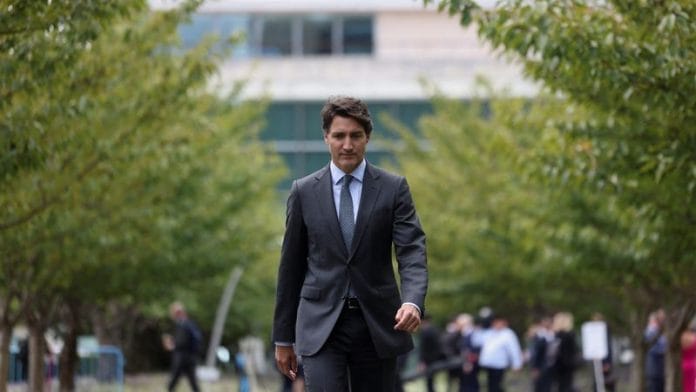New Delhi: In a rare late night statement Wednesday, the Ministry of External Affairs held Canadian Prime Minister Justin Trudeau’s “cavalier behaviour” solely responsible for the harm caused to the relations between the two countries.
The ministry’s reaction came hours after the Canadian prime minister admitted Wednesday that Ottawa had only “intelligence” and no “hard evidentiary proof” to link Indian officials to the killing of Hardeep Singh Nijjar, when Canada first reached out to New Delhi in August 2023.
A statement posted by MEA after 1 am Thursday read: “What we have heard today only confirms what we have been saying consistently all along—Canada has presented us no evidence whatsoever in support of the serious allegations that it has chosen to level against India and Indian diplomats.”
It further said, “The responsibility for the damage that this cavalier behaviour has caused to India-Canada relations lies with Prime Minister Trudeau alone.”
What Trudeau has said since last year
Speaking at the country’s foreign interference commission hearing Wednesday, Trudeau said that sometime in late July or early August last year, his government had received intel from the Canadian intelligence community as well as “possibly Five Eyes” allies, which indicated links between Indian officials and the murder of Nijjar—an India-designated terrorist.
“We chose to continue to work behind the scenes to try and get India to cooperate with us. Their ask of us was, ‘Well how much do you know? Give us the evidence on this.’ Our response was, ‘Well, it’s within your security agencies you should be looking into how much they know. You should be engaging us.’ ‘No no, tell us what you know, show us the evidence.’ At that point, it was primarily intelligence, not hard evidentiary proof,” Trudeau said.
The foreign interference commission was set up to look into claims of interference in Canada’s 2019 and 2021 general elections. The Canadian Security Intelligence Service (CSIS) alleges that India and China were the two key state actors to meddle in the 2021 federal election.
The MEA had categorically rejected in February any allegations of interference in the Canadian electoral process.
In September 2023, Trudeau had publicly claimed there were links between the Indian government and the killing of Nijjar. New Delhi had at the time called the allegations “absurd and motivated”, after which ties between the two countries went into a tailspin.
India had requested parity in diplomatic ties, calling for Canada to remove 41 diplomats from the country—a request which Ottawa eventually agreed to. In the year since, New Delhi has maintained that no actionable evidence has been shared by Canada to back its charge.
A couple of months after Trudeau’s allegations, the US Department of Justice indicted an Indian citizen, Nikhil Gupta, in a foiled plot to murder Gurpatwant Singh Pannun—another India-designated terrorist based in New York.
The US investigations into the foiled plot revealed that an Indian government employee that they had named “CC1” was allegedly involved in the plot to murder Pannun.
Unlike in the case with Canada, New Delhi has set up a high-level committee to look into US’ allegations. The panel members travelled to America earlier this week to continue their probe.
Ties between India and Canada hit another low this week, when Ottawa alleged that High Commissioner Sanjay Kumar Verma was a “person of interest” in the killing of Nijjar. India refused to accede to Canada’s request to waive diplomatic immunity for the six diplomats named, including Verma, and later withdrew them from the country.
India also expelled six high-ranking Canadian diplomats, including its acting high commissioner and deputy high commissioner, leading to a situation, where both countries have no ambassador-level presence left in either.
(Edited by Tikli Basu)






